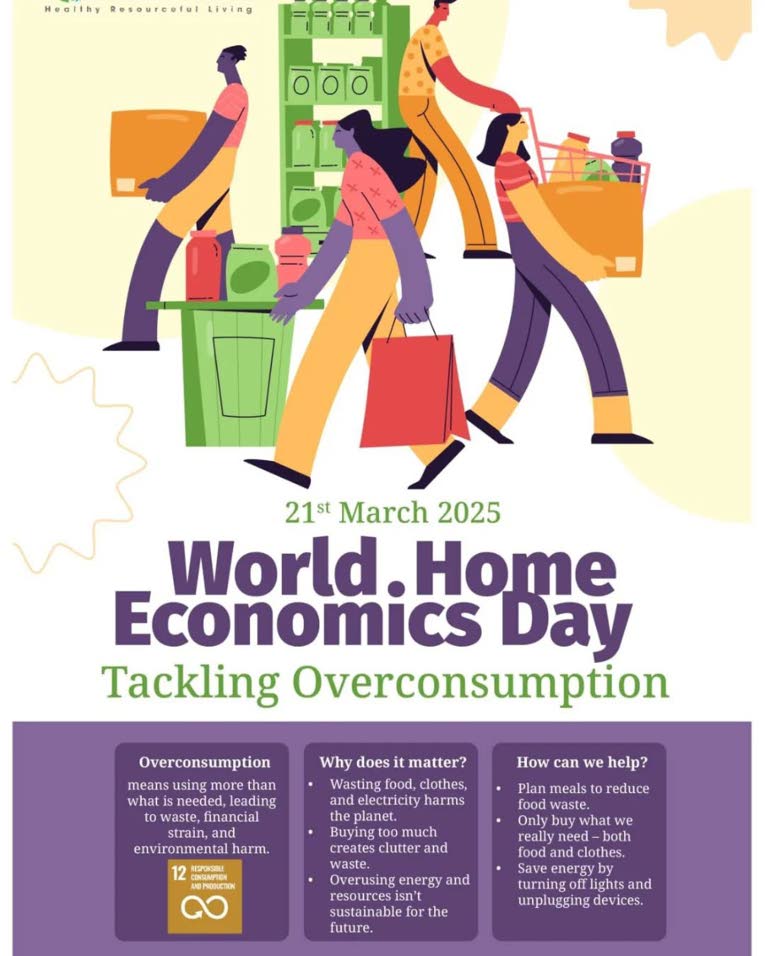March 21 marked World Home Economics Day, a global celebration of the critical role that home economics plays in promoting healthy, sustainable living. This year’s theme, “Tackling Overconsumption for a Better World,” emphasised the importance of mindful consumption and its impact on health and the environment. While the official observance is past, the message remains pertinent, particularly in Jamaica, where food safety, food waste, and responsible consumption continue to be key issues.
The theme resonated deeply within the context of food waste — a significant challenge that affects households, businesses, and communities across the island. In Jamaica, food is central to our culture, with our vibrant food traditions and a rich variety of local dishes. However, overconsumption and waste, whether at home, in restaurants, or within the supply chain, have a detrimental impact on both our environment and economy.

World Home Economics Day was a timely reminder that reducing food waste and adopting sustainable consumption habits are essential to creating a more sustainable future. The Link Between Food Safety, Food Waste, and Overconsumption Food waste and food safety are closely linked. The more food that is wasted, the greater the environmental burden and economic cost.
Improper handling and storage of food often lead to spoilage and contamination, posing risks to our health. For example, in the Caribbean, where warm temperatures prevail, food, particularly perishables like fruits, vegetables, and meats, can spoil quickly if not stored correctly, leading to both waste and potential foodborne illnesses. Overconsumption exacerbates the issue.
According to the Food and Agriculture Organization (FAO), nearly one-third of the food produced globally is wasted. In Jamaica, where food security is a challenge, this represents a significant loss of resources that could otherwise have been used to feed more people. Often, in our households, we buy more food than we can consume, and much of it ends up being discarded due to spoilage.
This is especially true for perishable goods like seafood, produce, and dairy. World Home Economics Day was a reminder that mindful consumption and careful meal planning can help prevent overbuying and reduce waste, which, in turn, improves food safety and reduces our overall environmental footprint. Sustainable Development Goal 12: Responsible Consumption and Production The observation of World Home Economics Day directly supports Sustainable Development Goal 12 (SDG 12), which focuses on responsible consumption and production.
This global goal advocates for reducing food waste, especially in households and retail settings, and encourages more sustainable food systems. SDG 12 sets ambitious targets, including halving per capita global food waste by 2030 and achieving sustainable food production. In Jamaica, embracing SDG 12 can have significant benefits.
Reducing food waste not only helps local families save money but also ensures that more resources are available to those in need. Additionally, it promotes environmental sustainability by reducing the carbon footprint associated with food production, transportation, and disposal. As a nation that relies on agriculture and fishing, moving towards a more sustainable food system can also support our local farmers and fishers, contributing to Jamaica’s economic resilience.
Why Reducing Overconsumption Matters for Jamaica Overconsumption, whether of food or other resources, is a growing concern. The rising cost of living, including the cost of food, makes it essential to be mindful of our purchasing habits. When food is overbought and wasted, we are not only losing money but also contributing to environmental degradation.
For example, food production is resource-intensive, requiring water, land, and energy. Wasting food means that all of these resources are essentially used for nothing. Reducing overconsumption ensures that we are using our resources efficiently and reducing the environmental strain on our ecosystems.
It also allows for a more equitable distribution of food, especially in a country like Jamaica, where food insecurity remains an issue for many. Practical Tips for Reducing Overconsumption and Food Waste While World Home Economics Day was a reminder of the need for responsible consumption, it’s crucial that we continue the conversation beyond just one day. Here are some simple, actionable tips for Jamaicans to reduce overconsumption and food waste: 1.
Plan Meals Ahead: Meal planning is a powerful tool for reducing food waste. By planning meals for the week, you can avoid buying excess food and ensure that everything you purchase gets used before it spoils. 2.
Practise Proper Food Storage: The key to preserving food and preventing spoilage is proper storage. Perishables like fruits, vegetables, meats, and seafood should be kept at the right temperatures to slow down spoilage. Freezing food that won’t be used immediately can help extend its shelf life.
3. Mindful Portioning: Often, we prepare more food than we can eat, leading to leftovers that go unused. Be mindful of portion sizes and only cook as much as you need.
Leftovers can also be repurposed into new meals, reducing waste. 4. Use Leftovers Creatively: Get creative with leftover food! Cooked meat, rice, and vegetables can easily be turned into soups, stews, or stir-fries, making sure that nothing goes to waste.
5. Shop Smart: When shopping for food, stick to a list and avoid purchasing in bulk unless you are certain the items will be used before they expire. Avoid impulse buying, especially for perishable goods.
6. Compost Food Scraps: Instead of throwing away food scraps like vegetable peels and cores, consider composting them. Composting reduces the amount of waste sent to landfills and creates valuable nutrient-rich soil for gardens.
7. Donate Unused Food: If you find yourself with surplus food, consider donating it to food banks or community organizations that serve those in need. 8.
Support Sustainable Practices: When possible, buy from local farmers, fishers, and producers who practice sustainable farming and fishing methods. This supports the local economy and promotes environmentally friendly food systems. 9.
Educate Yourself on Food Safety: Being aware of food safety practices, such as proper handling and cooking, can prevent foodborne illnesses and extend the shelf life of your food. For example, always store raw seafood in the fridge or freezer, and ensure that it’s cooked to the appropriate temperature. A Collective Effort Toward a Sustainable Future World Home Economics Day may have passed, but the lessons from the theme “Tackling Overconsumption for a Better World” are just beginning.
By taking responsibility for our consumption habits, Jamaicans can play a vital role in reducing food waste, improving food safety, and promoting sustainability in our communities. As we reflect on the importance of food safety and sustainability, let’s make it a priority to not only consume responsibly but also contribute to a better, more sustainable future for Jamaica and the world. About the Author Allison Richards is a food safety communicator and the founder of The Food Safety Girl, a consumer awareness platform dedicated to promoting food safety in Jamaica.
She is also the host of The Big Bite Food Safety Show, a radio program that educates listeners on food safety issues. With over 14 years of experience in food safety regulation, Allison is passionate about empowering consumers and industry stakeholders to make informed choices that protect both health and the environment..
Waste Not, Want Not: How Jamaica Can Lead in Responsible Consumption

March 21 marked World Home Economics Day, a global celebration of the critical role that home economics plays in promoting healthy, sustainable living. This year’s theme, “Tackling Overconsumption for a Better World,” emphasised the importance of mindful consumption and its impact on health and the environment. While the official observance is past, the message remains pertinent, particularly in Jamaica, where food safety, food waste, and responsible consumption continue to be key issues.The theme resonated deeply within the context of food waste — a significant challenge that affects households, businesses, and communities across the island. In Jamaica, food is central to our culture, with our vibrant food traditions and a rich variety of local dishes. However, overconsumption and waste, whether at home, in restaurants, or within the supply chain, have a detrimental impact on both our environment and economy. World Home Economics Day was a timely reminder that reducing food waste and adopting sustainable consumption habits are essential to creating a more sustainable future.The Link Between Food Safety, Food Waste, and OverconsumptionFood waste and food safety are closely linked. The more food that is wasted, the greater the environmental burden and economic cost. Improper handling and storage of food often lead to spoilage and contamination, posing risks to our health. For example, in the Caribbean, where warm temperatures prevail, food, particularly perishables like fruits, vegetables, and meats, can spoil quickly if not stored correctly, leading to both waste and potential foodborne illnesses.Overconsumption exacerbates the issue. According to the Food and Agriculture Organization (FAO), nearly one-third of the food produced globally is wasted. In Jamaica, where food security is a challenge, this represents a significant loss of resources that could otherwise have been used to feed more people. Often, in our households, we buy more food than we can consume, and much of it ends up being discarded due to spoilage. This is especially true for perishable goods like seafood, produce, and dairy. World Home Economics Day was a reminder that mindful consumption and careful meal planning can help prevent overbuying and reduce waste, which, in turn, improves food safety and reduces our overall environmental footprint.Sustainable Development Goal 12: Responsible Consumption and ProductionThe observation of World Home Economics Day directly supports Sustainable Development Goal 12 (SDG 12), which focuses on responsible consumption and production. This global goal advocates for reducing food waste, especially in households and retail settings, and encourages more sustainable food systems. SDG 12 sets ambitious targets, including halving per capita global food waste by 2030 and achieving sustainable food production.In Jamaica, embracing SDG 12 can have significant benefits. Reducing food waste not only helps local families save money but also ensures that more resources are available to those in need. Additionally, it promotes environmental sustainability by reducing the carbon footprint associated with food production, transportation, and disposal. As a nation that relies on agriculture and fishing, moving towards a more sustainable food system can also support our local farmers and fishers, contributing to Jamaica’s economic resilience.Why Reducing Overconsumption Matters for JamaicaOverconsumption, whether of food or other resources, is a growing concern. The rising cost of living, including the cost of food, makes it essential to be mindful of our purchasing habits. When food is overbought and wasted, we are not only losing money but also contributing to environmental degradation.For example, food production is resource-intensive, requiring water, land, and energy. Wasting food means that all of these resources are essentially used for nothing. Reducing overconsumption ensures that we are using our resources efficiently and reducing the environmental strain on our ecosystems. It also allows for a more equitable distribution of food, especially in a country like Jamaica, where food insecurity remains an issue for many.Practical Tips for Reducing Overconsumption and Food WasteWhile World Home Economics Day was a reminder of the need for responsible consumption, it’s crucial that we continue the conversation beyond just one day. Here are some simple, actionable tips for Jamaicans to reduce overconsumption and food waste:1. Plan Meals Ahead: Meal planning is a powerful tool for reducing food waste. By planning meals for the week, you can avoid buying excess food and ensure that everything you purchase gets used before it spoils.2. Practise Proper Food Storage: The key to preserving food and preventing spoilage is proper storage. Perishables like fruits, vegetables, meats, and seafood should be kept at the right temperatures to slow down spoilage. Freezing food that won’t be used immediately can help extend its shelf life.3. Mindful Portioning: Often, we prepare more food than we can eat, leading to leftovers that go unused. Be mindful of portion sizes and only cook as much as you need. Leftovers can also be repurposed into new meals, reducing waste.4. Use Leftovers Creatively: Get creative with leftover food! Cooked meat, rice, and vegetables can easily be turned into soups, stews, or stir-fries, making sure that nothing goes to waste.5. Shop Smart: When shopping for food, stick to a list and avoid purchasing in bulk unless you are certain the items will be used before they expire. Avoid impulse buying, especially for perishable goods.6. Compost Food Scraps: Instead of throwing away food scraps like vegetable peels and cores, consider composting them. Composting reduces the amount of waste sent to landfills and creates valuable nutrient-rich soil for gardens.7. Donate Unused Food: If you find yourself with surplus food, consider donating it to food banks or community organizations that serve those in need.8. Support Sustainable Practices: When possible, buy from local farmers, fishers, and producers who practice sustainable farming and fishing methods. This supports the local economy and promotes environmentally friendly food systems.9. Educate Yourself on Food Safety: Being aware of food safety practices, such as proper handling and cooking, can prevent foodborne illnesses and extend the shelf life of your food. For example, always store raw seafood in the fridge or freezer, and ensure that it’s cooked to the appropriate temperature.A Collective Effort Toward a Sustainable FutureWorld Home Economics Day may have passed, but the lessons from the theme “Tackling Overconsumption for a Better World” are just beginning. By taking responsibility for our consumption habits, Jamaicans can play a vital role in reducing food waste, improving food safety, and promoting sustainability in our communities.As we reflect on the importance of food safety and sustainability, let’s make it a priority to not only consume responsibly but also contribute to a better, more sustainable future for Jamaica and the world.About the AuthorAllison Richards is a food safety communicator and the founder of The Food Safety Girl, a consumer awareness platform dedicated to promoting food safety in Jamaica. She is also the host of The Big Bite Food Safety Show, a radio program that educates listeners on food safety issues. With over 14 years of experience in food safety regulation, Allison is passionate about empowering consumers and industry stakeholders to make informed choices that protect both health and the environment.














